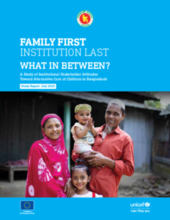This study is complementary to the alternative care assessment and explores the perceptions and attitudes of policymakers, judges, and frontline child protection practitioners toward alternative care. It finds broad consensus that children thrive best in families, yet institutional care remains the default due to the lack of structured alternatives. Stakeholders highlighted poverty, violence, social stigma, and climate-related displacement as major drivers of separation, while also pointing to weak family support services and limited oversight of institutions. Encouragingly, the study identifies growing momentum for reform, including recognition of the potential of kinship care and openness to piloting foster care. It recommends a three-pronged strategy: enabling kinship care with support, piloting formal foster care, and transforming existing institutions into smaller, family-like environments, underpinned by investment in a professional social service workforce. Together, the two studies chart a pathway to ensure that every child in Bangladesh grows up in a safe and nurturing family environment.

